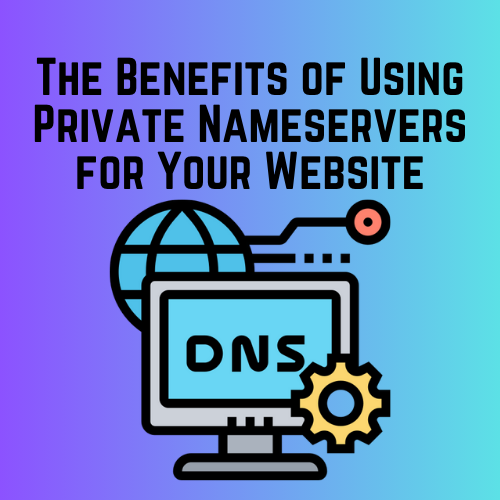Table of Contents
Introduction:
In today’s competitive online landscape, establishing a strong and professional digital presence is more important than ever. While many businesses focus on website design and content, the underlying infrastructure, like DNS management, often goes overlooked. One critical aspect that can significantly impact your online branding and control is the use of private nameservers. Unlike generic nameservers provided by hosting companies, private nameservers allow you to customize and brand your DNS settings using your own domain name. This article explores why private nameservers are a valuable asset, offering benefits such as enhanced control, increased privacy, and a more polished online image.
What is private Nameservers?
Private nameservers are custom DNS servers branded with your own domain name, such as ns1.yourdomain.com, instead of using generic nameservers from a hosting provider. They enhance professionalism by reinforcing your brand, provide greater control over DNS settings, and allow for white-labeling, which is useful for web hosting resellers. Additionally, private nameservers offer increased privacy by obscuring the identity of your hosting provider and allow for advanced DNS management tailored to your specific needs. They are a valuable tool for businesses and individuals seeking a more customized and professional online presence.

Benefits of Private Nameservers:
- Branding: Private nameservers help reinforce your brand by allowing you to use your own domain name in the DNS configuration.
- Professionalism: They provide a more professional appearance, which is especially beneficial for businesses or resellers.
- Control: You have greater control over DNS settings and can more easily manage multiple domains.
- Anonymity: They can also help obscure your hosting provider, offering some level of anonymity.
How to Set Up Private Nameservers:
- Register the Nameservers: Go to your domain registrar and register the custom nameservers. This usually involves assigning the nameservers (
ns1.yourdomain.com,ns2.yourdomain.com, etc.) to specific IP addresses provided by your hosting provider. - Configure DNS Settings: On your hosting server, you’ll need to configure DNS to recognize and use these private nameservers. This typically involves setting up DNS zones and A records.
- Update Domain Settings: Finally, you’ll need to update the domain settings for your domain (and any other domains you manage) to use these new private nameservers.
Using private nameservers is common for web hosting resellers or businesses that want to provide white-labeled hosting services.
The features of Private Nameservers
Private nameservers come with several features that provide added control, branding, and customization for domain and DNS management. Here are the key features:

1. Custom Branding:
- Personalized Names: Private nameservers allow you to use your own domain name as the prefix for the nameservers (e.g.,
ns1.yourdomain.com), which reinforces your brand identity. - Professional Appearance: Custom nameservers give a more professional and polished look, especially important for businesses, resellers, or web developers.
2. Enhanced Control:
- Full DNS Management: You have complete control over the DNS settings, allowing you to manage DNS records like A, CNAME, MX, and TXT records according to your needs.
- Advanced Configuration: Ability to configure advanced DNS settings such as TTL (Time to Live) values, custom records, and more, providing flexibility to fine-tune your domain’s performance.
3. Reseller Capabilities:
- White-Labeling: Private nameservers are essential for resellers who want to offer hosting services under their own brand without revealing the actual hosting provider.
- Multiple Client Management: Allows you to manage multiple client domains under a single set of branded nameservers, simplifying administration.
4. Increased Privacy:
- Hosting Provider Anonymity: By using private nameservers, you can hide the identity of your hosting provider, which can be beneficial for privacy and security reasons.
- Domain Privacy: Private nameservers help obscure the infrastructure details of your domain, reducing the risk of targeted attacks or unwanted attention.
5. Reliability and Performance:
- Redundancy: Private nameservers can be set up across multiple servers or data centers to ensure redundancy, enhancing the reliability and uptime of your DNS service.
- Load Balancing: Some configurations allow for load balancing, distributing traffic across multiple servers to improve performance and reduce latency.
6. Customization:
- Tailored DNS Settings: You can customize DNS settings to better suit your specific needs, such as setting up custom SPF records for email security or specific redirects.
- Geo-Location Targeting: In some cases, private nameservers can be configured for geo-targeted DNS, improving user experience by serving content from geographically closer servers.
7. Scalability:
- Easily Expandable: As your business grows, private nameservers can be scaled to manage additional domains and handle more traffic without the limitations often imposed by third-party DNS providers.
These features make private nameservers a powerful tool for businesses and individuals looking to maintain greater control and present a professional, branded online presence.
Conclusion:
Private nameservers are more than just a technical enhancement; they are a powerful tool for businesses and individuals looking to strengthen their online presence. From providing greater control over DNS settings to reinforcing your brand identity, the advantages of using private nameservers are clear. Whether you’re a web hosting reseller, a business owner, or someone keen on maintaining a professional image, investing in private nameservers can help you achieve your goals. As you consider your domain management strategy, remember that the choice of nameservers can make a significant difference in how your brand is perceived and how effectively you can manage your online assets.
